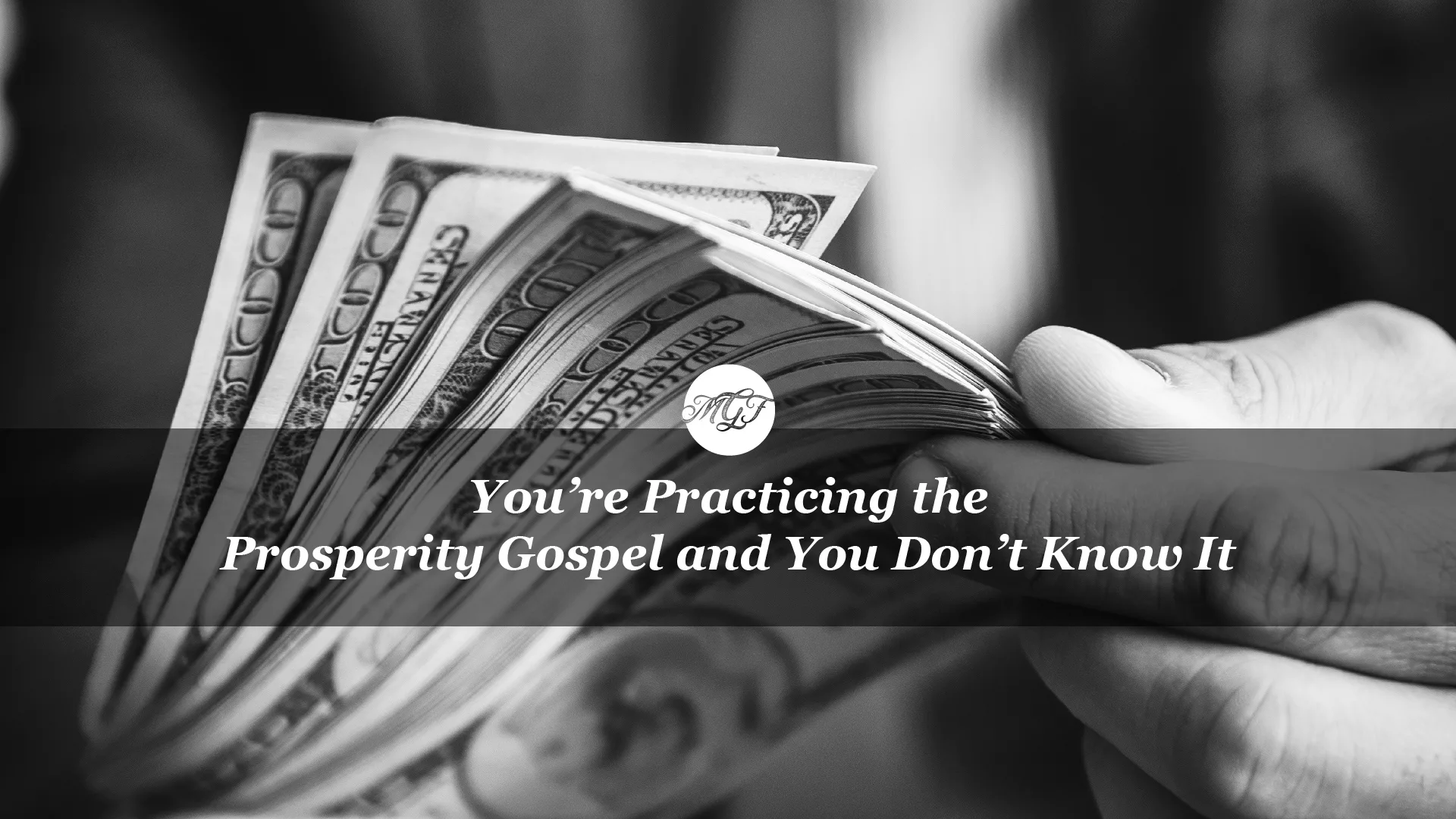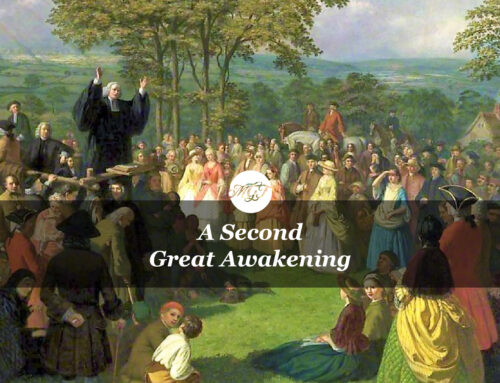I bet you believe some form of the Prosperity Gospel and don’t even know it.
It’s a four-letter word in the Church today: Prosperity Gospel charlatans and their ilk have come to be known as the snake oil salesman of evangelicalism and the New Apostolic Reformation. They show up on Sundays in their $5,000 hoodies and $1,200 sneakers. They fly in on their private jets. They televise their services to millions each week. They tout their wealth and promise that you too can have it if you just have as much faith as they do.
And millions fall for it.
But for the rest of us, we know better, don’t we? We’d never fall for that nonsense. We’d never be taken in by Prosperity Gospel Pushers. We know the Bible better than that.
That’s what I thought, too. It took me far too long to see just how far the tentacles of this pervasive theology have spread into the evangelical church and just how destructive they can be.
At Its Heart
At the root of the Prosperity Gospel is the belief that your faith is only as strong as you are and that with enough prayer, enough worship, and enough belief, God will do anything through you. That’s how these charlatans excuse their disgusting practices — by disguising them under the umbrella of faith. I spoke about this briefly on TikTok recently, but I once worked for a worldwide Christian organization that practiced the Prosperity Gospel in all its forms, especially financially. We were required to take calls for the bi-annual telethon, and I once spoke with an elderly woman who pledged $1,000 to the organization on her credit card, maxing it out because the pastor had promised her that if she sowed $1,000, she would receive $10,000 in return.
God said so. He told the pastor. How could it not be true?
I know that’s an extreme example. And I know that maybe you and I are too clever to fall for that ruse. But what other forms of this heresy have we fallen for without thinking twice? If we’re part of a church that teaches this sort of belief structure, then the Prosperity Gospel is alive and well in our mindsets, whether we like it or not.
So how do you know if your church teaches the Prosperity Gospel? I have a few ideas that might surprise you.
Branded Self-Help Sermons
If the sermons are centered on self-help, if the topics are indistinguishable from what you could learn on a daytime talk show, your church might be teaching the Prosperity Gospel. In other words, if the messages are peppered with a sentence or two from scripture now and then, they’re topical, not expository. Expository teaching is when a pastor simply teaches the Bible, line by line, verse by verse. This kind of teaching is not popular in the evangelical church anymore, mainly because it’s not easy to package in a marketable brand (like movie-themed sermon series). It’s more fun to find a theme and then find a scripture or two that fits it than it is to comb through verses to find and apply their meaning. But self-help is not what God is after. He doesn’t care about your happiness (sorry to disappoint), he cares about your holiness. Story after story, book after book, we read of the men and women of God in the Bible who were called to lay aside themselves for the sake of the will of God and the Gospel. They weren’t called to “live their best life” or “find themselves.” They were called to die to who they thought they were. There is nothing self-helpful about true Christianity. It is, at its root, a denial of one’s “self” and a call to become who God designed all along. It’s total surrender, utter submission, and complete self-denial. If the last sermon you heard was teaching you how to live your best, you’re being taught the Prosperity Gospel.
Behavior Modification
If there is an underlying focus on behavior modification and not spiritual discipline, your church might be teaching the Prosperity Gospel. In other words, if the messages you’re hearing, whether from the pulpit or the programs, are structured around the idea of living “like a Christian,” you’re being taught behavior modification. At its root, this idea implies that when you do the things Christians do, you’re a Christian. When you act as a Christian should act, you’re doing it right. Practically speaking, this usually plays out by teaching something along the lines of: If you want a good marriage, learn to communicate, have sex regularly, and don’t forget to date! Sure, those things might help, but they do not address the deeper discipline of self-sacrifice, of putting the needs of your spouse above your own, and living in a way that is in surrender to the Biblical model of marriage. In other words, behavior modification teaches what, but never bothers to explain why. This is how the Prosperity Gospel works: get the benefits, don’t worry about what it takes to reap them.
Emotionalism
This is a big one. I see these far too often — Christians who equate how they felt in a service to something deeper. They’ll tell the pastor or worship leader they’re “anointed.” They’ll believe that it must be a sign of truly loving God if they felt something stir them to cry or lift their hands. In this environment, there is very little (if any) emphasis on worshipping for the sole purpose of disciplining our hearts to honor and glorify God. Instead, every service is designed to attract the lost, entertain them while they’re there, and hopefully feel something, because the belief is that if they feel something, they’ll want more. At the heart of this mentality is the idea that the church is for us. It’s not. Sorry to disappoint you. Church is for God and God alone.
The best way I can explain this is to use the analogy of a birthday party for your kid. Yes, you throw the party for her. You go to the expense, the time, the trouble. And yes, you enjoy watching her delight in the balloons and presents and cake. But the benefits you experience from watching her eyes light up are ancillary. You don’t throw the party because you’re chasing that feeling — you throw the party because you love her. You benefit from what was designed intentionally and expressly for her. But therein lies the difference we overlook too often — because we benefit from worship, we have assumed it’s for us. So we look for its benefits. We look to feel something. We look to get something out of it — peace, absolution, answers, hope, joy. When instead, the only reason we should show up on a Sunday morning is to turn our hearts to the Father and tell him how much we love him. Full stop. Anything else that happens is secondary, not the point. When we forget that, we build a form of the Prosperity Gospel that says God is standing around waiting to bless us. Far too often, churches design their entire philosophy around the hope that people can get something out of the service instead of what the people are giving and sacrificing in the name of discipline and adoration of the Father.
These are just a few examples. I could go on but for the sake of this conversation, I’m going to leave it at that. The point is this: if anything you believe or practice in church or your religion is centered around you and how you benefit, you’re practicing the Prosperity Gospel. You’re practicing hedonism — the pursuit of your pleasure as the highest good. You’re practicing the idea that if you sow in, you’ll reap the harvest. You’re forgetting that God is the one who reaps the harvest. It’s his seed, his plant, his rain, his bounty. He’s simply invited you to the table with him out of his goodness.
Does this mean we should never experience emotions when it comes to God? Absolutely not! Does this mean our behavior will not modify as a result of following God? Of course not! Does this mean that we will not be helped by applying Christian principles to our lives? God I hope not!
The point is simply this: those things should be the result, not the endgame. Christianity that is rooted in what you get out of it, not how you surrender to the Father, is not Christianity at all, but a form of hedonism that says, “This is the thing that’s going to make me happy.”
If we can remember that, then maybe we can put some fundamental things about our faith into perspective and stop building Jesus Country Clubs that make us feel like we’ve accomplished something.














